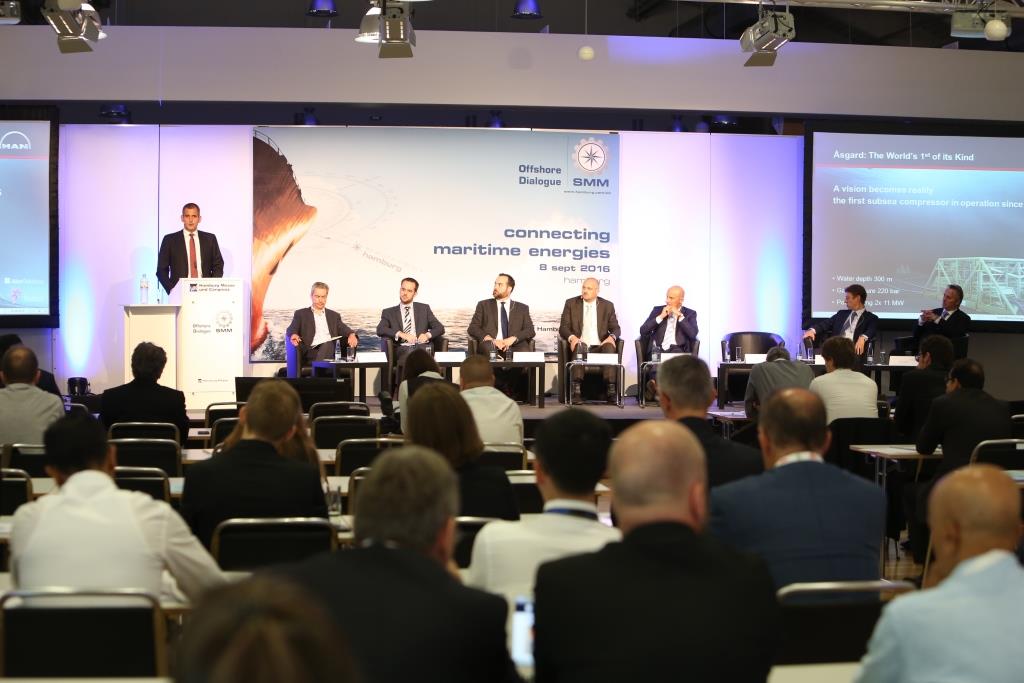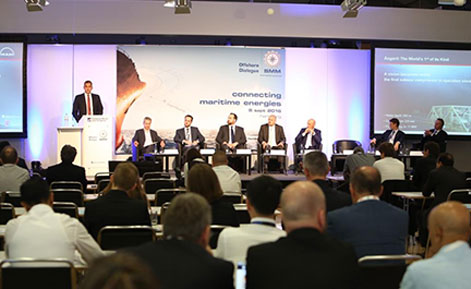Deep-sea mining and eco-friendly resource utilization in the Arctic: How can the maritime industry overcome these tough challenges? At the Offshore Dialogue held in Hamburg on 6 September 2018 during SMM, the leading international trade fair of the maritime industry, experts will explore the risks and opportunities of this market segment.
The depths of the oceans harbor some of Earth's last great secrets. Under the motto of "Pushing the limits – new maritime technologies for future needs”, renowned experts will discuss at the Offshore Dialogue (OD) how the treasures and resources found on and below the Arctic sea bottom can be tapped using innovative maritime technologies without harming the environment. Organized jointly with GMT, the German Association for Marine Technology, this conference will take place on 6 September as part of SMM, the leading international maritime trade fair.
 Precious nodules
Precious nodules
One potential future source of a valuable raw material rests on the seafloor at depths around 5,000 meters: Manganese or polymetallic nodules. The most plentiful deposits occur off the western coast of Mexico, in the Peruvian Basin, and in the Indian Ocean. These lumps not only contain manganese but also iron, copper, cobalt, and nickel. Recent technological advances are letting it appear more economically attractive than ever to exploit these valuable ores. An overview of current technology and research into deep-sea mining will be given by Heiko Felderhoff from the shipowning company Harren & Partner in a lecture titled “Deep-sea mining of massive sulfides – a completely new technical approach”. A member of the DeepSea Mining Alliance (DSMA), the company is pursuing sea-bottom exploration and development projects around the earth.
The ecosystems surrounding the valuable polymetallic nodules are known to be extremely vulnerable. Changing the density of a nodule deposit will affect deep-sea biodiversity, a fact that is of particular significance because this resource is non-renewable: “The nodules grow by as little as a few millimeters or centimeters in a million years,” says Prof. Dr. Andrea Koschinsky of Jacobs University Bremen, whose lecture “Challenging environmental aspects of responsible manganese nodules mining” will look at some of the ecological implications. Joury Van Gijseghem, General Manager at the Belgian maritime technology specialist DEME Blue Energy, will describe from a practical viewpoint how mining equipment should be designed to ensure responsible retrieval of polymetallic nodules.
In icy climates
Around the world highly qualified scientists are working hard to solve the mysteries of the deep sea. Their most important tools are high-tech research vessels capable of performing a multitude of functions and withstanding the most extreme ambient conditions. These maritime laboratories require huge capital investments. Einar Vegsund, VP Design & Hydro at Rolls Royce Marine, will explain how to plan an optimal polar research vessel. His company is a key player in this market segment, having designed the new Norwegian icebreaker Kronprins Haakon, which is now serving as a model for the British research vessel “Sir David Attenborough”, a 200 million pound project slated to start operating in 2019.
One key issue to keep in mind when designing ships of this type is the sturdiness of the hull because pack ice is common in the sea regions they operate in. The Polar Code, in effect since January 2017, is the relevant international standard for ships and offshore structures. In her speech, IMO safety expert Sandra Allnutt will retrace the development of this piece of international legislation. The General Manager Market Innovation of Wärtsilä, Teus van Beek, will speak about eco-friendly propulsion systems. The Finnish ship engine manufacturer Wärtsilä is considered a pioneer in Green Shipping. For example, the German research and surveying vessel Atair, scheduled for commissioning in 2020, will be equipped with Wärtsilä machinery. She is the first German government-owned vessel propelled by liquefied natural gas (LNG).
The shipyards and suppliers involved in these sophisticated shipbuilding projects must deliver leading-edge technology. Nils Reimer from the Hamburg Ship Model Basin will elaborate on important details to consider when building such vessels, and on ship types suitable for research and mining missions in Arctic regions.
According to estimates of the US Geological Survey, 13 per cent of the world's unknown oil deposits, and as much as 30 per cent of natural gas reservoirs, might be hidden under the bottom of the Arctic Ocean. How could man use these resources without causing significant damage to the environment? This is the topic of a lecture by Anu Fredrikson, Director Arctic Economic Council. The question to what extent climate change will change overall conditions for shipping will be the subject of an analysis by Robert Tustin, Consultant Ship New Construction at Lloyd’s Register. Whatever the scenario, the expert points out, stakeholders must quickly adapt to new trade routes.
Promising niche market
With its focus on deep-sea mining and the utilization of Arctic resources, the Offshore Dialogue will give participants a comprehensive overview of these multifaceted topics and the business opportunities they offer to the maritime industry. A former niche market is turning into a fascinating growth sector. SMM visitors will find related products, experts and services in the exhibition halls of the Hamburg Messe fair complex.
About SMM
The leading international maritime trade fair takes place at the Hamburg Messe und Congress fair complex every two years. With roughly 2,200 exhibitors and 50,000 visitors from all continents, SMM is the world's most important industry event. It covers the entire value chain of the maritime sector, bringing together international decision-makers and experts and providing a platform for highlighting innovative technology.
The 2018 fair will take place from 4 to 7 September, once again under the honorary patronage of German chancellor Dr. Angela Merkel. On 3 September 2018, the day before the four-day exhibition opens, the conference program will launch with the international Maritime Future Summit (MFS).


